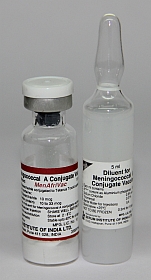
MenAfriVac by Serum Institute of India, India, gets BioSpectrum Asia Pacific Awards 2013 in the Product of the Year 2013 category
Neisseria meningitidis (meningococcus) is a cause of the contagious bacterial meningitis that can lead to life-threatening infections in infants, children and young adults. Studies have indicated that the treatment of a meningitis epidemic has been present in Africa for about 100 years. The disease is most prevalent in the sub-Saharan meningitis belt, an area that stretches from Senegal and Gambia in the west to Ethiopia in the east. Approximately, 430 million people are at risk of contracting the disease, which occurs in the dry season (between December and June). A wave of this epidemic can last up to two-to-three years.
The vaccine, MenAfriVac, was developed to combat this epidemic in Africa and the story of its research and development dates back to the year 2000. The Meningitis Vaccine Project (MVP) was initiated by World Health Organization (WHO) with PATH. The Bill and Melinda Gates Foundation, in 2001, granted $70 million to WHO and PATH for the project. Dr F March LaForce was appointed project director of MVP and the project was established at the PATH office in France. The aim was to develop a high-quality vaccine for $0.50 per dose or less.
Serum Institute of India was roped in to manufacture the product, which was developed as a result of this initiative.
Dr Hitesh Malviya, additional director, polysaccharide conjugate vaccine manufacturing, Serum Institute of India (SII), who was also responsible for the manufacture of MenAfriVac, says it was a challenging project as Meningococcus A was the first product in meningitis vaccine category. "We had to make sure that our efficiency in manufacturing was so good that we are able to make low-cost vaccines with the highest possible quality," elaborates Dr Malviya. Serum Institute got the license to manufacture the vaccine from the Drug Controller General of India (DCGI) in 2010 and also received its WHO prequalification the same year. "We manufacture 55 million doses of vaccine every year and till date more than 150 million doses have been manufactured," he adds.
Elaborating on the conjugate vaccine production, Dr Malviya says it requires good knowledge of chemistry and microbiology. "Initial part of the manufacturing process requires understanding of how bacteria grow and the optimum condition for the right quality of the product in fermentation. One needs to have downstream knowledge to purify polysaccharides," he explains. The next challenge is to prepare polysaccharides to be conjugated with the carrier protein. "You have to create functional groups in the polysaccharides and in the carrier protein, so that they conjugate with each other. Once this is done, you have a conjugated biomolecule," says Dr Malviya. Another challenge is to get rid of the unconjugated polysaccharide and the unconjugated carrier protein. The product is then kept on shelf to assess the expiry date.
Serum Institute, which has solid infrastructure for large-scale manufacturing, can deliver the vaccine as per the GMP conditions. "People do conjugation at a small-scale because of cost factor, lack of experience in handling conjugation at a large scale. We are the biggest producer of tetanus oxide in the world. So, we are able to leverage that technology for the purpose of large-scale conjugation," says Dr Malviya.
The company has state-of-the-art facilities and the best equipment for each and every step. "It gives us very good control over the manufacturing process in terms of quality and reproducibility. For example, our fermentors from Switzerland have a beautiful control system. Once you set the parameters, then it runs on its own, thereby guaranteeing the quality of the product. For downstream, we use the GE chromatography system. It gives good and consistent supply of the product. Thus we have the technology and process to scale-up from milligram to gram," he adds.
Once the product is manufactured, the company is responsible for its delivery to the Mumbai airport, from where Unicef takes on the responsibility. Thus, the product does not require much marketing efforts by Serum. "Unicef coordinates with the local health ministries for mass immunization campaigns. The program includes 25 sub-Saharan countries," says Dr Malviya. The company is committed to producing MenAfriVac for Unicef till 2017-18 for carrying out the large-scale immunization campaigns. After that, the company can take the product to other countries.
MenAfriVac has been introduced through a two-pronged approach. One is mass vaccination to gain immediate benefits and the other is through integrating it in the routine childhood vaccination programs. Comprehensive mass immunization campaigns for one-year to 29-year-olds with a single dose of MenAfriVac are the cornerstones in the vaccine introduction plan. The strategy aims to reduce bacterial carriage and transmission and thereby rapidly reduce disease-related morbidity and mortality rates. The first three countries for the phased vaccine plan were Burkina Faso, Mali and Niger. The first round of vaccination took place in September 2010 and about 100 million have already been vaccinated with this single-shot lifelong effective vaccine till now.
The product
The Men A conjugate vaccine is filled in 5mL glass vials (type I, USP), stoppered with grey bromobutyl rubber closures, type-slotted and after freeze-drying closed with flip-off aluminium white color seal. The lyophilized vaccine vial contains a powder of Meningococcal group A polysaccharide conjugated to Tetanus Toxoid protein. The vaccine is provided along with MenAfrivac Diluent. The diluent ampoule contains aluminium phosphate as an adjuvant and a preservative. The vaccine also has a vaccine vial monitor label. It is supplied in a box containing 50 vials (10 doses in each vial) and a box containing five blister trays of 10 ampoules of diluent.




